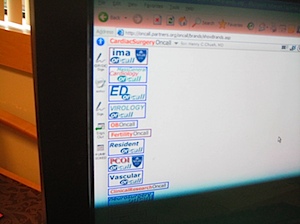While at Massachusetts General Hospital last week, as a guest of The Stoeckle Center for Primary Care Improvement, I was invited to meet the team at the Laboratory of Computer Science based at MGH. The Lab of Computer Science produces the OnCall series of clinical web portals, which are a front end to the Computer Stored Ambulatory Record medical record system.
The reason it is a “series” and not “a front end” is because this system actually has brands that are specific to the specialties and care that it supports. Here’s a picture from a computer screen that shows them:
Why is this interesting? Because it’s doable – this ambulatory record system communicates using an XML platform, and has been doing so since 1996. XML, as I mentioned in a previous post, is an uber-industry standard for moving data across systems outside of health care, and is now getting traction in health care. Having it as a foundation for an electronic health record system back to 1996 has some advantages, like the one you can see above. Different types of care can access the same data differently.
In my usual LEAN way, I asked if I could see OnCall in action, and so I shadowed Henry Chueh, MD during his clinic day (with each patient being asked for their consent before I entered the room). I found the interface to be very user centric, with lots of modern AJAX-y touches, as one would expect for an EHR that is being continually improved by a team of physicians that practice medicine regularly. Back to the XML though, the happiness is not that the user experience is good, it’s that it can be improved perhaps easier than another system because the data is moved around in standard ways. It’s almost like the team could create a patient version of the same record using a style sheet – which is something of a holy grail in patient access, in my opinion.
OnCall is going to be used as the basis for the Ambulatory Practice of the Future, also being designed at MGH. The idea is that a practice that can continuously improve will do best with an electronic system that can do the same, quickly.
There isn’t yet a patient portal attached to OnCall, but one is being worked on under the leadership of Henry and JeanHee Chung, MD, MS, a practicing internist and member of the LCS team. They showed me an early prototype of a patient front end and system named “ACCORD” (Ambulatory Care Compact to Organize Risk and Decision-making) which takes a personal health record one step farther than I have seen, by connecting patients and physicians to agreements around treatment plans. There’s a short summary of the project here at the AHRQ Web Site. I think this would be an exciting development for an electronic system and I was delighted to meet the parents of the OnCall system and get a glimpse into the future of a personal health record that uses data to model patient-centeredness.
Thanks to MGH and the Lab of Computer Science team for the warm welcome. LCS is sort of legendary in Informatics circles in terms of the vision it brought to medicine around the use of computers, and it was good to see in the flesh.

1 Comment
Interesting post on EHR. Would like to see that all hospitals and doctors are using some kind of EMR/EHR. Too bad that only a few % of the doctors actually use EMR.